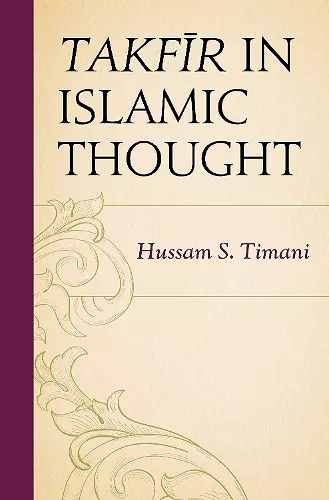Takfir in Islamic Thought
Format:Hardback
Publisher:Lexington Books
Published:8th Nov '17
Currently unavailable, and unfortunately no date known when it will be back

This book provides an overview of the theological views on takfīr in classical and medieval Islamic thought, explores the Islamic context of the concept, and considers the following questions: In what context does the term appear in the Qur’ān and ḥadīths (the sayings of the Prophet Muḥammad)? In what circumstances did Muslim theologians engage in takfīr, and what were the social, religious, theological, and political implications on the society? How did the meaning of takfīr evolve in classical and later Islamic theology, and what justifications did prominent medieval Muslim theologians and jurists provide for declaring other Muslims kuffār? This book attempts to demonstrate how takfīr has evolved throughout the centuries from being a term used to condemn (and warn against) unacceptable actions to a term used on individuals and communities to strip them of their belief, dignity, and linkage to the Divine (i.e., declaring them unbelievers). This book also attempts to shed the light on how the theological discourse on takfīr in classical and medieval Islam has made its impact on twentieth- and twenty-first century groups.
This study provides a clear and useful overview of early and medieval Islamic positions on takfīr (declaring someone an infidel). Against this background, the recent ideological deployment of takfīr by some extremists may be criticized and ultimately rejected as an illegitimate misuse of Islamic tradition. -- Marcia K. Hermansen, Loyola University Chicago
Hussam Timani’s Takfīr in Islamic Thought is a systematic and in-depth study of a practice that has, unfortunately, become increasingly prevalent in contemporary Islam: namely, branding a fellow Muslim as a non-Muslim. Drawing extensively on the Qur’ān, ḥadīths (the reported sayings of Prophet Muhammad), and classical Arabic texts, Timani demonstrates that there has always been a vigorous debate among Muslim scholars about the understanding of iman (belief) and kufr (disbelief) and, by extension, the definition and legitimate usage of takfīr. I was particularly impressed by Timani’s attention to questions of nuance and complexity. He not only contrasts a variety of theological schools—the Kharijites, Murji’ites, Karramites, Mu‘tazilites, Ash‘arites, and Maturidites—but even analyzes differing perspectives within these schools. This book will become essential reading for anyone interested in religious pluralism in Muslim contexts, especially in terms of intra-faith dialogue. -- Shadaab Rahemtulla, University of Wales Trinity Saint David
ISBN: 9780739194256
Dimensions: 237mm x 160mm x 15mm
Weight: 327g
124 pages